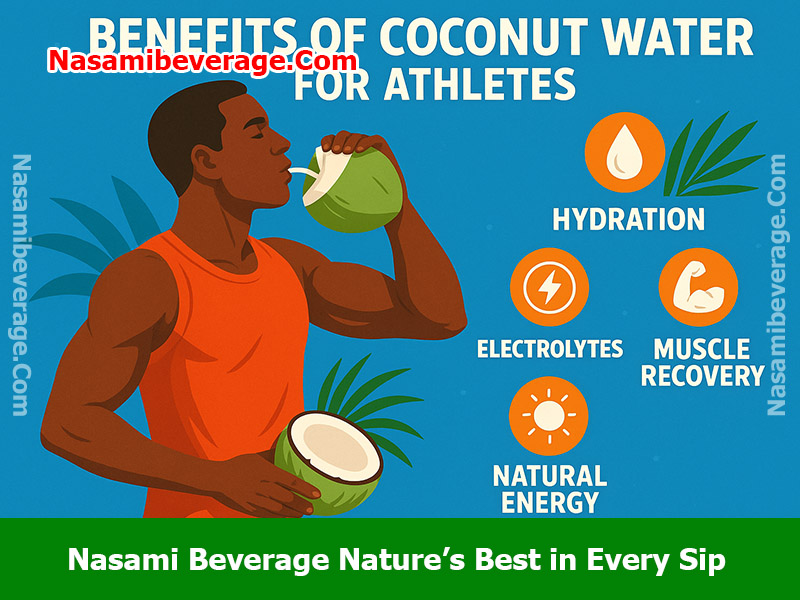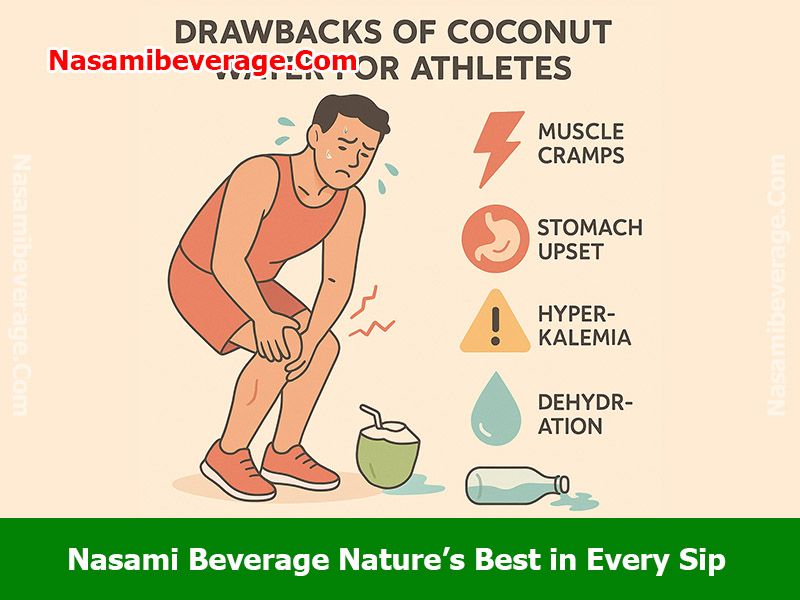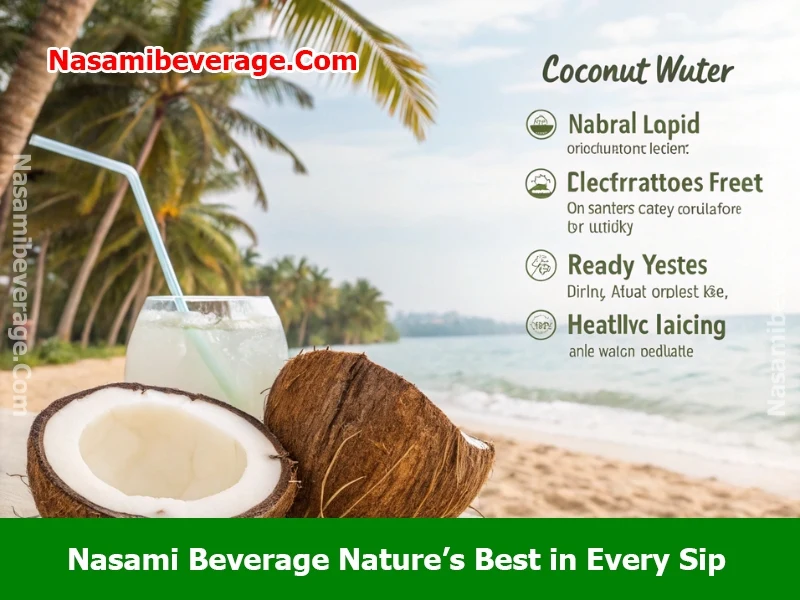Is coconut water good for athletes? Coconut water has surged in popularity among athletes seeking natural hydration solutions. This article explores its nutritional profile, benefits for athletic performance, and potential drawbacks compared to sports drinks and plain water. From electrolyte replenishment to limitations in sodium content, we dive into scientific evidence and practical tips to help athletes decide if coconut water suits their needs. Discover when to use it, how it stacks up, and whether it deserves a spot in your gym bag.
What is coconut water?
Composition and nutritional profile
Coconut water, the clear liquid found inside young green coconuts, serves as a natural source of hydration packed with essential nutrients. Each cup contains approximately 470mg of potassium, 25mg of sodium, 15mg of magnesium, and 9g of carbohydrates, offering a low-calorie profile at just 45 calories.
Curious about how many carbs in coconut water? It’s light enough for most diets but still provides energy for workouts. Unlike coconut milk, which is high in fat and used in cooking, coconut water focuses on hydration and electrolyte balance, making it a favorite among fitness enthusiasts aiming for clean, plant-based fuel.
How it differs from sports drinks
Sports drinks like Gatorade or Powerade are engineered with higher sodium and carbohydrate content to support intense exercise. They often contain 110mg of sodium and 14g of carbs per cup, alongside artificial flavors. Coconut water, by contrast, relies on naturally occurring electrolytes and sugars, appealing to athletes prioritizing whole-food nutrition. Its lower sodium and calorie count make it less suited for prolonged, high-sweat activities but ideal for lighter workouts or recovery.
Benefits of coconut water for athletes
Electrolyte replenishment
Potassium, a key electrolyte in coconut water, supports muscle function and helps prevent cramps during exercise. Magnesium aids energy production, while small amounts of sodium contribute to fluid balance. For athletes training in moderate conditions, this natural blend can effectively restore electrolytes lost through sweat, offering a cleaner alternative to processed beverages. Wondering if it really hydrates? Learn more about does coconut water help with hydration.
Natural Hydration and Low Calories
With minimal sugar and no artificial additives, coconut water provides hydration without the calorie overload of many sports drinks. Its light, refreshing taste appeals to health-conscious athletes who want to avoid synthetic sweeteners. This makes it a smart choice for gym-goers or runners seeking to maintain performance while keeping calorie intake in check.

Potential Performance Boost in Heat
Research, such as a 2012 study in the Journal of the International Society of Sports Nutrition, suggests coconut water can enhance endurance in hot environments. Athletes performing in temperatures above 90°F showed improved time-to-exhaustion when hydrated with coconut water, likely due to its carbohydrate and electrolyte content. This makes it a compelling option for outdoor sports like cycling or marathon running.
Drawbacks of coconut water for athletes
Low sodium content
Sodium is critical for replacing what’s lost in sweat, especially during intense or prolonged exercise. Coconut water’s 25mg of sodium per cup pales in comparison to sports drinks, which can provide over 100mg. For endurance athletes, relying solely on coconut water risks hyponatremia, a condition caused by low blood sodium levels, potentially leading to fatigue or dizziness.
Gastrointestinal issues
Some athletes report bloating or stomach discomfort when consuming coconut water during workouts. A 2023 study noted that its high potassium and sugar content may irritate sensitive stomachs, particularly when consumed in large volumes mid-exercise. Moderation and gradual introduction can help mitigate these effects. For tips on improving its taste, check out how to make coconut water more palatable.

Limited carbohydrates for endurance
Endurance sports demand sustained energy, often requiring 30-60g of carbohydrates per hour. Coconut water’s 9g per cup falls short for activities like ultramarathons or triathlons. Athletes may need to pair it with carb-rich foods, such as bananas or energy gels, to meet energy demands effectively.
Coconut water vs. sports drinks vs. plain water
Hydration effectiveness
Studies, including one by Kalman et al. (2012), show coconut water rehydrates as effectively as sports drinks and plain water for most workouts. Its electrolyte content gives it a slight edge over water for moderate exercise, but sports drinks outperform in high-sweat scenarios due to higher sodium. For short gym sessions, plain water often suffices, making coconut water a middle-ground option.
Performance outcomes
Performance benefits depend on the activity. Coconut water supports hydration and energy in hot, moderate workouts but lacks the carbohydrate density for long-distance events. Sports drinks excel in sustained efforts, while plain water is adequate for low-intensity or short-duration training. Trial-and-error helps athletes find the best fit.
Cost and accessibility
Plain water remains the most affordable and accessible hydration option. Coconut water, priced at $1-$3 per serving for brands like Vita Coco or Zico, is moderately expensive but widely available. Sports drinks vary in cost but often include artificial ingredients. Coconut water’s eco-friendly sourcing adds appeal for environmentally conscious athletes.
When should athletes use coconut water?
Ideal scenarios
Coconut water shines in moderate workouts, hot weather, or post-exercise recovery. Runners completing a 5K or cyclists training for an hour can benefit from its natural electrolytes and refreshing taste. It’s also a great choice for athletes avoiding synthetic drinks or seeking a low-calorie recovery option after yoga or strength training.

Tips for incorporation
Choose reputable brands like Harmless Harvest or Zico, and check labels for added sugars. Diluting with water can reduce sugar concentration for sensitive stomachs, while pairing with a sodium-rich snack, like pretzels, boosts its effectiveness. Sip 8-16 oz post-workout or during lighter sessions to maximize hydration without overloading on potassium.
What the science says
Research offers mixed insights. A 2012 study found coconut water comparable to sports drinks for rehydration but noted no significant performance edge. A 2023 PMC article highlighted its potassium benefits but warned of sodium limitations. Small sample sizes and varying exercise conditions limit conclusions, suggesting athletes consult dietitians to tailor hydration strategies to their needs.
FAQ – Is coconut water right for you?
Is coconut water better than sports drinks for athletes? Coconut water provides natural electrolytes but lacks the sodium and carbs found in sports drinks, making it less effective for high-intensity, sweaty workouts.
Can coconut water prevent muscle cramps in athletes? Its potassium may help reduce cramps, but sodium is equally important. Combining it with a sodium source enhances its effectiveness.
How much coconut water should athletes drink daily? Post-workout, 8-16 oz is typically enough, depending on exercise intensity and sweat loss. Adjust based on individual needs.
Are there any risks to drinking coconut water for athletes? Overconsumption may cause high potassium levels, particularly for those with kidney issues. Moderation is key.
Coconut water offers a natural, potassium-rich hydration option for athletes, particularly for moderate workouts or hot conditions. Its low sodium and carbohydrate content, however, make it less ideal for intense, prolonged exercise compared to sports drinks. Experiment with brands like Nasami Beverage or pair it with sodium sources to optimize its benefits. Explore what works for your body and elevate your hydration game today.



